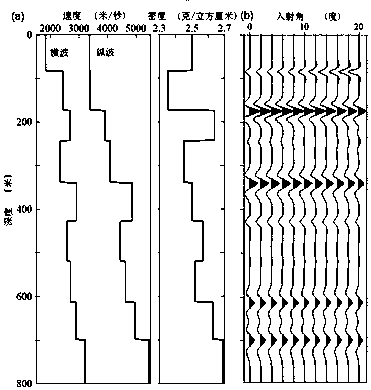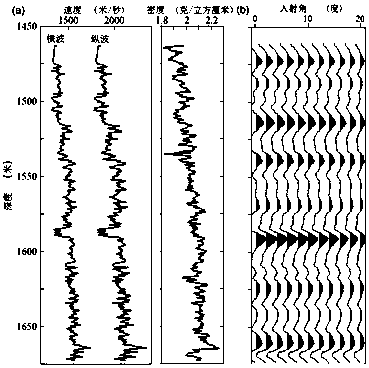A method for making pre-stack depth-domain synthetic seismic records
A technique for synthesizing seismic records and production methods, applied to seismic signal recording, etc., can solve problems such as loss of reflection coefficient information, lack of effective information, and failure to consider the nature of seismic wavelet changes in depth domains, etc.
- Summary
- Abstract
- Description
- Claims
- Application Information
AI Technical Summary
Problems solved by technology
Method used
Image
Examples
Embodiment Construction
[0030] Embodiments of the present invention include the following steps: (1) input depth domain seismic data and elastic parameter (compressional wave velocity, shear wave velocity and density) model, obtain depth domain seismic reflection coefficient R (θ, iΔh) according to AVO equation calculation; (2 ) using the P-wave velocity field to convert the depth domain seismic data to the velocity V mIn the constant-velocity depth domain under (3) Using the depth-domain P-wave velocity model and the constant velocity V m , and map the sampling interval sequence in the depth domain to the constant velocity depth domain to obtain the non-uniform sampling interval sequence in the constant velocity depth domain; (4) pick up the seismic wavelet in the constant velocity depth domain The depth value of the peak, using the depth and the non-uniform sampling interval sequence in the constant-velocity depth domain to calculate the non-uniform sampling depth sequence of the depth-domain se...
PUM
 Login to View More
Login to View More Abstract
Description
Claims
Application Information
 Login to View More
Login to View More - R&D
- Intellectual Property
- Life Sciences
- Materials
- Tech Scout
- Unparalleled Data Quality
- Higher Quality Content
- 60% Fewer Hallucinations
Browse by: Latest US Patents, China's latest patents, Technical Efficacy Thesaurus, Application Domain, Technology Topic, Popular Technical Reports.
© 2025 PatSnap. All rights reserved.Legal|Privacy policy|Modern Slavery Act Transparency Statement|Sitemap|About US| Contact US: help@patsnap.com



